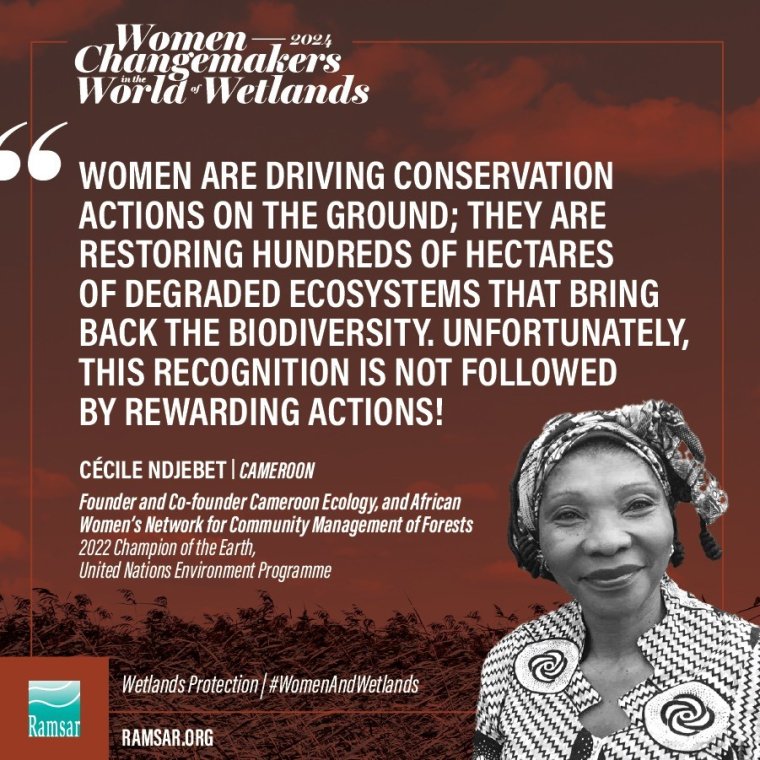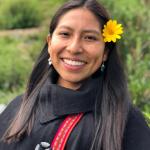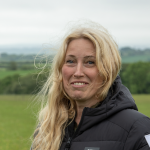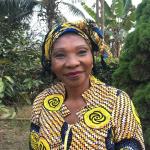
Cecile Ndjebet
Founder Cameroon Ecology, and Co-founder African Women’s Network for Community Management of Forests.
Biography
Cécile Ndjebet is a prominent figure in African civil society organizations, celebrated internationally for her tireless advocacy for women's rights and environmental sustainability. With over 36 years of experience, she began her career as a Cameroonian civil servant in 1986, later transitioning to the civil society sector in 1997.
Founding the national NGO Cameroon Ecology in 2000, Ndjebet has been a vocal advocate for community rights, particularly those of rural and Indigenous women, regarding forests, land, and natural resources. Ndjebet has initiated policy reforms and led initiatives aimed at preserving and restoring mangrove forests.
Her extensive expertise in gender mainstreaming and women's rights has been instrumental in shaping policies and initiatives related to natural resource management, including gender and tenure, REDD+, climate change, and biodiversity.
In 2009, Ndjebet co-founded the African Women's Network for Community Management of Forests (REFACOF), a platform dedicated to promoting women's participation in natural resource management across Africa. This initiative has garnered significant regional support, with 20 member countries from West and Central Africa.
Recognized for her leadership, Ndjebet was elected as the Climate Change Champion of the Central African Commission on Forests (COMIFAC) in 2012. She holds membership in numerous networks and professional societies at national, regional, and global levels, including the Network of African Women Environmentalists (NAWE), the United Nations Decade on Ecosystem Restoration Advisory Board, and the African Forest Forum Governing Council.
Ndjebet's contributions extend beyond advocacy to concrete action, as she has spearheaded policy reforms and initiatives aimed at preserving forests and supporting vulnerable communities, particularly women and youth, affected by climate change. Her dedication to building institutional capacity and mobilizing resources has had a transformative impact at grassroots levels and beyond.
Trained as an Agronomist and Social Forester, Ndjebet holds a Master's degree in Social Forestry from Wageningen Agricultural University in The Netherlands. She is currently pursuing her Ph.D. at the Central Africa Catholic University, focusing on gender relations and access to land in rural Cameroon.
Her remarkable achievements have earned her prestigious accolades, including the Wangari Maathai Prize and the United Nations Champion of the Earth award. Recognized for her unwavering commitment to environmental conservation and social justice, Ndjebet continues to inspire positive change on a global scale.

Questions and Answers
What personal experience has shaped or inspired your journey?
My journey was shaped by my love of the forest and inspired by my mother and my elder sister. I grew up with the two wonderful women! They were both farmers and living off their agricultural activities and forest products collection.
At the age of four, I was going to the farm with my mother and my sister. I learned very early how to farm, and how to collect wild products from the forest; I learned about the forest's value and its importance for our lives. I liked contemplating nature; there were beautiful streams where we often had fun and we used the bottom as a mirror! the water was very clear and sometimes, we could see beautiful fish that we had fun catching! everything was beautiful, ... the climate was cool!!
With my mother, I learned to love, respect, and care for the forests and their biodiversity. At the age of five, I could go by myself into the forest to collect mushrooms, leaves, and the bark of specific tree species, firewood, nuts, fruits, and many other forest products. At that young age, I knew very well what type of forest product was edible, what was used for medicine, how to collect the products without destroying the tree, etc. The forests gave us everything! We were fully dependent on the forests! From my childhood, I loved forests and the diverse products we found in the forests!
I also experienced the challenges that my mother and other women in the village were facing to live and sustain their families; this created in me a very deep desire to support them, to defend them! Who I am and what I do today, comes from everything I experienced with my mother and my sister.
Who is the influential figure who has inspired your actions, and what specifically about them has been motivating?
Late Professor WANGARI MAATHAÏ was the most influential person who inspired my actions. I met late Professor WANGARI MAATHAÏ in 2009; she visited our small organisation Cameroon Ecology (Cam-Eco), one of the first six grantees of the first Congo Basin Forest Fund (CBFF) she created. A one-day meeting that completely changed my professional life. She was so committed to nature, forests, and the environment, ... she explained to me how for years she had been fighting for forest conservation and environmental protection, … her love for nature was unreserved!!!
She counted so much on women to succeed in her fight! For her, only women could help to recover the greenery of African landscapes, destroyed by the unsustainable and irresponsible practices of humans! So, I mobilize African women to plant the trees!
As we separated, she told me "This is the mission I leave to you: mobilize all African women; sensitize them to plant trees; tell them to plant fruit trees; they will bring them many benefits; they will improve the nutrition of their children and their families; they will generate income through the sale of surplus fruit; and the trees will help mitigate the negative impacts of climate change. The entire world will benefit from their actions! So, get the women to plant the trees"!
These words have remained engraved in my memory and this visit was the trigger for my commitment to reforestation, conservation, the fight against illegal logging, and the fight for women's rights on land and forests. Since then, I’ve been supporting women’s efforts in planting trees, restoring degraded ecosystems, and terrestrial and mangrove forests, bringing back biodiversity, and healing the planet! Protecting the environment!! The Women have planted millions of trees so far!!
In your conservation efforts for wetlands, what key challenges did you face and how has this experience fuelled your dedication to making a positive impact?
The major challenge is to convince people to change their behavior and practices! Conservation still needs a lot of information, awareness, and education! It is thanks to this perseverance that I managed together the rural women, to restore hundreds of hectares of degraded mangrove ecosystems!! In addition, our approach is based on the involvement of women, men, and young people. The conservation we practice is with a human face!! In our approach, we design everything with women and men; and increasingly young people. A conversation with a human face is more likely to succeed!! Local communities own it much easier and get engaged when their interests and concerns are taken into consideration; and when they are part of the decision-making and of the benefit-sharing.
This requires trust, confidence, and commitment!
All women in this category: Wetland Protection

Dayana Blanco Quiroga
Co-founder of the Uru Uru Team
More information
Sacha Dench
Founder of Conservation Without Borders Ambassador for the UN Convention on Migratory Species.
More information
Cecile Ndjebet
Founder Cameroon Ecology, and Co-founder African Women’s Network for Community Management of Forests.
More information